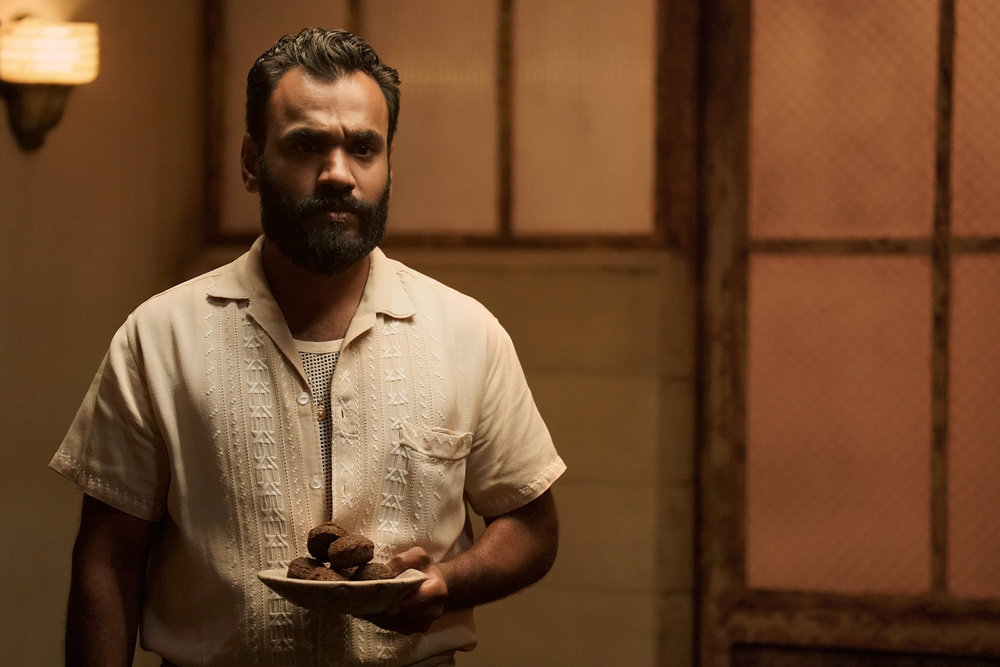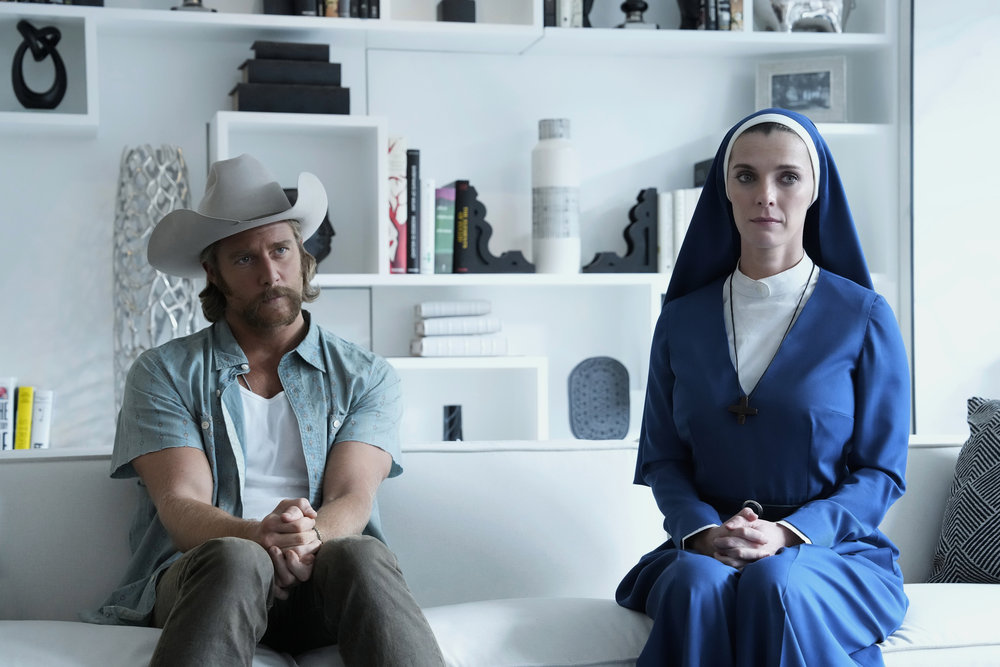Damon Lindelof has, over the past two decades, become one of the most distinctive voices in television. Mrs. Davis, the captivating new sci-fi drama he created with The Big Bang Theory alum Tara Hernandez, might be the most prototypically Damon Lindelof show of his career. Like Watchmen, it balances cosmic themes and emotional storytelling with playful pop-culture references, cartoonish violence, and absurd humor. Like Lost, it carefully metes out puzzle-box backstory and can get tangled in its own shaggy-dog sensibility. And like both of the above, but especially Lindelof’s masterpiece, The Leftovers, it’s concerned with the ways in which faith and morality persist in a world that has largely replaced organized religion with other forms of belief.
In this case, that timely substitute for a higher power is none other than artificial intelligence. The AI is, in fact, the title character of Mrs. Davis, an eight-part Peacock series whose first half will drop on April 20 (followed by single-episode debuts on subsequent Thursdays). While its name varies from culture to culture, the algorithm known in the U.S. as Mrs. Davis—a nod to its interface, which has all the comforting warmth of a kindergarten teacher—is like an all-powerful Siri, whispering gently into the earbuds of users around the globe and using the information it aggregates from them for greater purposes that the public has reason to believe are benign.
Mrs. Davis abstainers are, as a result, incredibly rare. The show’s heroine, an unconventional Nevada nun who believes the algorithm killed her father, is one of them. Played with the perfect balance of toughness, tenderness, and sparkling intelligence by the wonderful Betty Gilpin, Sister Simone patrols the desert on horseback, foiling the elaborate extortion schemes of con-artist magicians, and seems to be in a relationship of sorts with a restaurant cook named Jay (Andy McQueen). Her indulgent Mother Superior (Margo Martindale) tolerates all of it.

Life at the convent—jam making, softball playing, and prayer—delights Simone. But Mrs. Davis keeps trying to communicate with her. First it’s random users asking to “proxy,” or allow Mrs. Davis to speak to Simone through their mouths. Then the algorithm starts constructing action-movie set pieces to get her attention. It turns out Mrs. Davis has, for unknown reasons, chosen Simone to embark on a seemingly impossible quest: the AI wants her to find the Holy Grail. Yes, that Holy Grail, the legendarily powerful relic that has permeated Western mythology since the Middle Ages. (As one character puts it: “Algorithms love cliché, and there’s no cliché bigger than the Holy Grail.”) If she succeeds, Mrs. Davis will grant Simone a wish. What Simone wants more than anything is for Mrs. Davis to shut down. To her surprise, the algorithm agrees to the deal.
The ensuing adventure has all the elements of Watchmen-era Lindelofian pop maximalism. There are high-octane chase scenes, Fight Club sendups, a contest called “Excalibattle” that is basically Hands on a Hardbody but with a mammoth replica of Excalibur instead of a truck, a scientist named Schrödinger (Ben Chaplin) who’s spent years stranded on a desert island with a cat. (Paging Lost’s Daniel Faraday.) Episodes that aren’t quite standalones nonetheless feel distinct in setting and subject matter, from a deep dive into Simone’s unhappy childhood to an ’80s flashback that cleverly recasts one of the show’s establishing scenes. Simone finds herself caught in a love triangle of sorts with Jay and her childhood friend Wiley (Jake McDorman), a self-styled cowboy outlaw who’s on a parallel quest to take down Mrs. Davis.

Coalescing in the background of each punchy spectacle are Hernandez and Lindelof’s ideas about faith and science, magic and technology—and how these apparent opposites serve similar purposes in our lives, giving us something to believe in that also, in turn, comforts us by reinforcing our existing prejudices. Grounded in Simone’s estrangement from her mom, Celeste (Elizabeth Marvel), the same concept of comfort manifests in Mrs. Davis’ obsession with mother-daughter bonds, whether the maternal figures in question happen to be good, bad, biological, surrogate, metaphorical, or otherwise. Call it Everything Everywhere Holy Grail.
As in that movie, the thrilling pace, sharp wit, and exuberant imagination of Mrs. Davis sometimes paper over uneven development of characters and themes. For that reason, I tended to feel less invested in the show’s various relationship arcs than I wanted to be. The creators resolve the plot nicely, often drawing smart connections between apparently unlinked elements of the story. While their take on Christianity allows room for nuance and interpretation, the allegory’s ultimate verdict on technology-as-deity turns out to be thuddingly obvious.
In a show that was less fun and brainy and energetic, these might have been fatal flaws. Happily, Hernandez and Lindelof’s dynamic storytelling and Gilpin’s agile performance—supported by a great cast that also includes David Arquette, Chris Diamantopoulos (Silicon Valley), and Evil star Katja Herbers—go a long way. If it doesn’t quite amount to the Holy Grail of streaming-era television, at least Mrs. Davis is well worth the quest.
More Must-Reads From TIME
- The 100 Most Influential People of 2024
- Coco Gauff Is Playing for Herself Now
- Scenes From Pro-Palestinian Encampments Across U.S. Universities
- 6 Compliments That Land Every Time
- If You're Dating Right Now , You're Brave: Column
- The AI That Could Heal a Divided Internet
- Fallout Is a Brilliant Model for the Future of Video Game Adaptations
- Want Weekly Recs on What to Watch, Read, and More? Sign Up for Worth Your Time
Contact us at letters@time.com